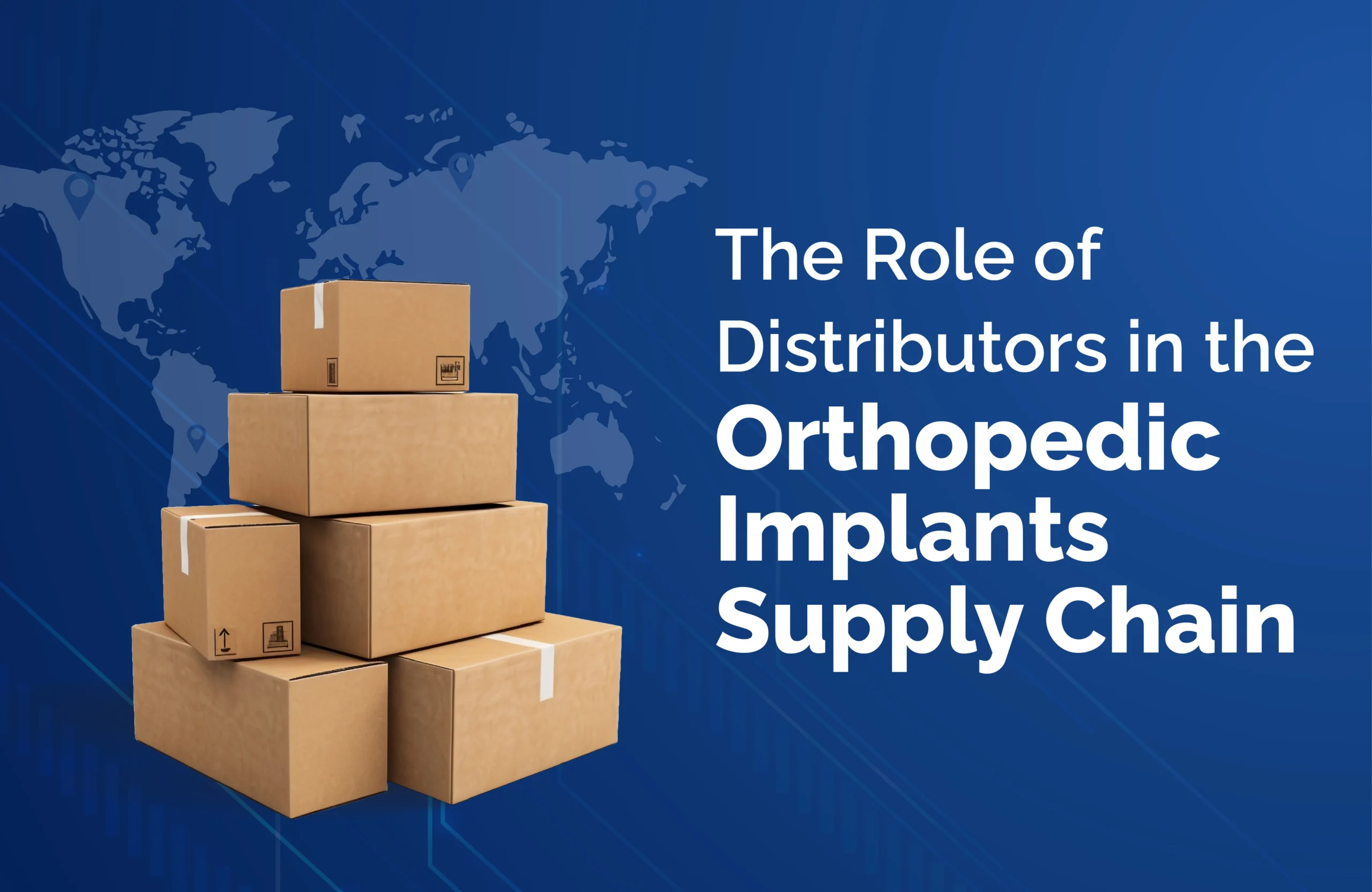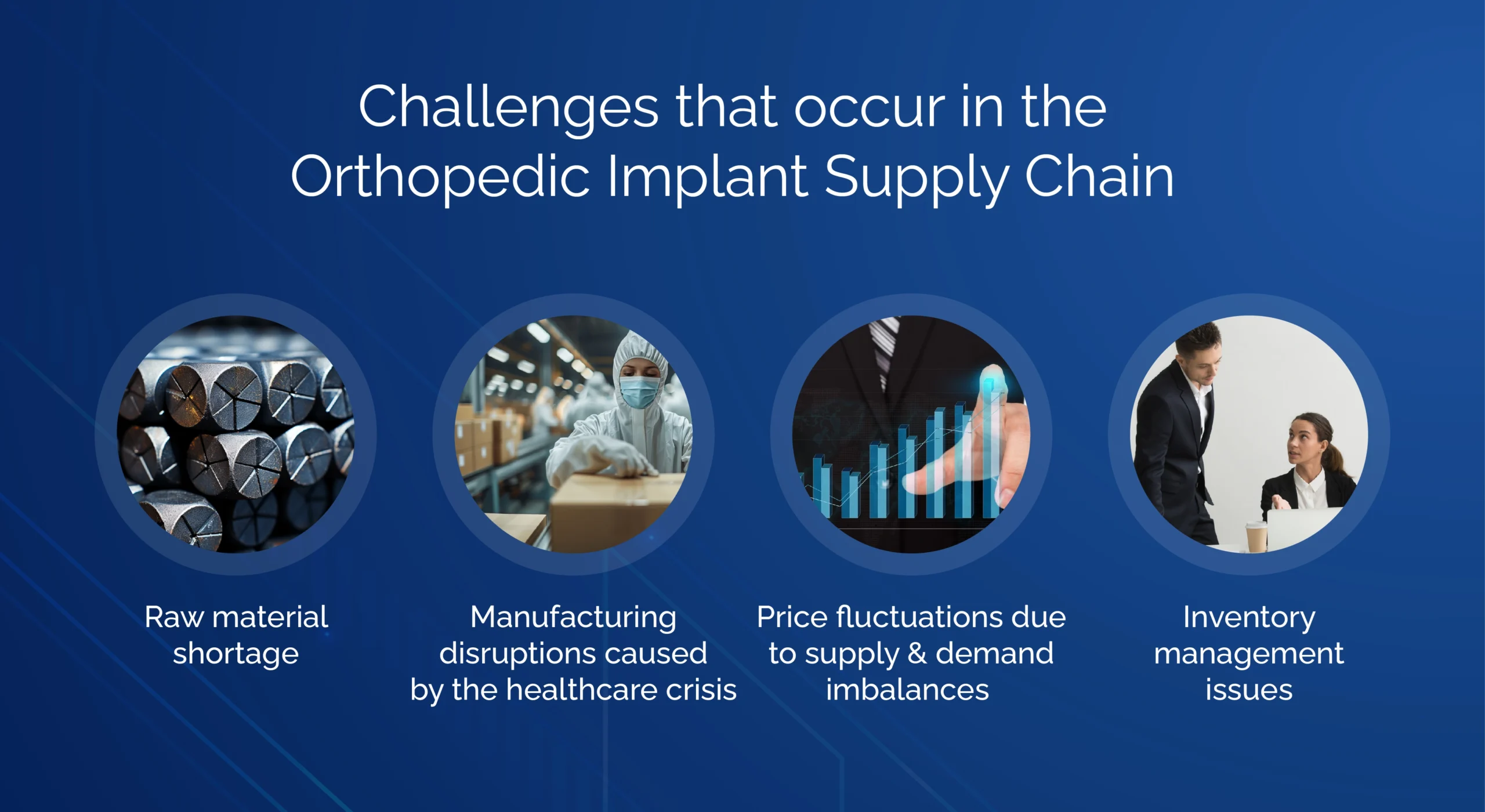The global orthopedic implants industry is a critical pillar of the healthcare sector, providing healthcare solutions to millions suffering from musculoskeletal disorders and injuries. However, what you see on the outside is just a small part of the entire orthopedic implant supply chain that takes place behind the scenes. An intricate supply chain management process and network ensure that these orthopedic implants reach hospitals, clinics, and ultimately patients worldwide.
The global orthopedic implants market was valued at around USD 47–48 billion in 2022 and is expected to reach a staggering USD 71–74 billion by 2032, with a CAGR of 4.20–5.80%. This market growth is driven by factors like an increasing geriatric population, rising demand for minimally invasive surgeries, and technological advancements in implant design and materials. At the heart of this supply chain management process lie the distributors, facilitating the seamless flow of orthopedic implants from manufacturers to end-users.
In this blog, we will understand what the orthopedic implant supply chain comprises and how distributors play a vital role in the global orthopedic supply chain.
Understanding the Orthopedic Implants Supply Chain
Before exploring the role of distributors, it is essential to understand the orthopedic implant supply chain. The chain usually consists of manufacturers, distributors, healthcare providers, and patients. Manufacturers produce a diverse array of orthopedic implants which undergo rigorous testing and approvals before entering the market.
The Role of Distributors
Distributors serve as active mediums in the orthopedic implant supply chain, bridging the gap between manufacturers and end users. They possess multi-faceted responsibilities that are crucial for the efficient handling of supply chain management.
1. Market Access & Expansion
Distributors have extensive networks and market knowledge, allowing manufacturers to access regions and territories they might not reach otherwise. By using their local expertise in the orthopedic implant market, distributors facilitate market expansion, enabling orthopedic implants to reach diverse populations globally.
2. Inventory Management
Managing an inventory efficiently is pivotal in the healthcare sector due to surplus demand and subsequent product expiry. Distributors maintain optimal inventory levels, ensuring that healthcare providers have timely access to orthopedic implants without the risk of stockouts or overstocking.
3. Regulatory Compliance
Navigating the complex intricacies of regulatory requirements is a daunting task for manufacturers. Distributors act as intermediaries, ensuring that products comply with local regulations and standards before reaching healthcare facilities. This includes handling documentation, certifications, and adherence to quality control measures.
4. Optimizing Mediation
As we all know, distributors often form the link between manufacturers and end-users. They actively put a foot forward in optimizing routes, minimizing transit times, and bringing optimal orthopedic implants to the end-consumers, namely surgeons and hospital owners.
5. Customer Support and Education
Healthcare providers rely on distributors for product information, training, and technical support. Distributors often play a huge role in driving sales for orthopedic implant manufacturers because they are involved in educating surgeons and healthcare staff on the availability of orthopedic implants on the market.
Challenges faced by Distributors in the Implant Supply Chain
Despite distributor’s inevitable role in the orthopedic implant supply chain process, there are several challenges that they face in the process. Let us take a look at them.
1.Pricing Discrepancies:
Distributors often get into arguments and negotiations with manufacturers on the pricing of orthopedic implants, because the pricing policy of many manufacturers is too stringent.
2. Delayed Delivery:
At the end of the day, distributors are also “part” of a big supply chain. They have an end customer to cater to and if the delivery gets delayed, their end customers remain unhappy, and as a result, they end up losing business.
3. No After-Sales Service:
Many a time, manufacturers and exporters go unreachable after the implants have been bought, proving no accountability for the quality of their implants. This creates a hindrance in the supply chain process, leading to accountability and responsibility problems on the part of the distributors.
Zealmax Ortho: One-Stop Solution for Distributors
 In the global orthopedic supply chain, distributors face many challenges. But where can they find the help they need?
In the global orthopedic supply chain, distributors face many challenges. But where can they find the help they need?
That’s where Zealmax Ortho steps in. Established in 2006, our mission is to empower human movements worldwide. With over 15+ years of leadership experience in the field of global orthopedics, Zealmax Ortho aims to bring forth a positive change in the orthopedic market.
What makes us stand out is our dedication to providing after-sales support. We understand what distributors go through when the delivery of orthopedic implants does not happen on time. That’s why we promise to provide reliable support to the distributors at the right time so that they don’t lose business.
Additionally, we also offer flexible pricing, ensuring everyone in this world can have fair and equal access to quality implants at affordable rates. Furthermore, we also streamline the documentation process to expedite deliveries and ensure prompt customs clearance. At Zealmax Ortho, we prioritize efficiency and customer satisfaction.
Zealmax Ortho aims to offer a one-stop comprehensive solution, guiding distributors through every stage of their journey. By ensuring smooth operations and achieving successful outcomes, we strive to make a positive difference in the lives of the patients.



